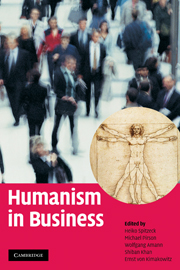Book contents
- Frontmatter
- Contents
- List of figures
- List of tables
- List of editors and contributors
- Acknowledgements
- Humanistic Management Network: paving the way towards a life-serving economy
- Introduction
- Part 1 Philosophic-historical grounding of humanism
- 1 Philosophical grounds of humanism in economics
- 2 The humanist tradition
- 3 Humanism and culture: balancing particularity and universalism among the world's religions
- 4 A requisite journey: from business ethics to economic philosophy
- 5 The global economy from a moral point of view
- 6 The implications of humanism for business studies
- 7 Current trends in humanism and business
- Part 2 Towards an integration of humanism and business on a systems level
- Part 3 Humanistic management
- Part 4 The individual as a change agent for a humane business society
- Index
- References
2 - The humanist tradition
Published online by Cambridge University Press: 25 January 2011
- Frontmatter
- Contents
- List of figures
- List of tables
- List of editors and contributors
- Acknowledgements
- Humanistic Management Network: paving the way towards a life-serving economy
- Introduction
- Part 1 Philosophic-historical grounding of humanism
- 1 Philosophical grounds of humanism in economics
- 2 The humanist tradition
- 3 Humanism and culture: balancing particularity and universalism among the world's religions
- 4 A requisite journey: from business ethics to economic philosophy
- 5 The global economy from a moral point of view
- 6 The implications of humanism for business studies
- 7 Current trends in humanism and business
- Part 2 Towards an integration of humanism and business on a systems level
- Part 3 Humanistic management
- Part 4 The individual as a change agent for a humane business society
- Index
- References
Summary
It has been said that humanism is “as old as human civilization and as modern as the twentieth century” (Elias and Merriam: 109). To avoid becoming dated, I would suggest that humanism is as ancient as humanity and as new as the latest scientific discovery. Or, to put it more prosaically, humanism is a recent name for a philosophy with ancient roots that seeks constantly to update itself in the light of new knowledge.
The terms “humanism” and “humanist” have been used in many different contexts. They have referred to the educational program of Renaissance scholars, as well as to movements in art, literature, psychology, architecture, and other cultural fields. While these senses differ, they all share a central focus on humanity, often representing a move away from concerns with divinity. Thus the Encyclopedia of the Social Sciences defines humanism as, “That which is characteristically human, not supernatural, that which belongs to man and not to external nature, that which raises man to his greatest height or gives him, as man, his greatest satisfaction.”
Today, the term “humanism” is most often used in reference to a comprehensive worldview, or life stance, that the Merriam Webster Dictionary defines as “a doctrine, attitude, or way of life centered on human interests or values; especially: a philosophy that usually rejects supernaturalism and stresses an individual's dignity and worth and capacity for self-realization through reason.
- Type
- Chapter
- Information
- Humanism in Business , pp. 26 - 51Publisher: Cambridge University PressPrint publication year: 2009
References
- 4
- Cited by



